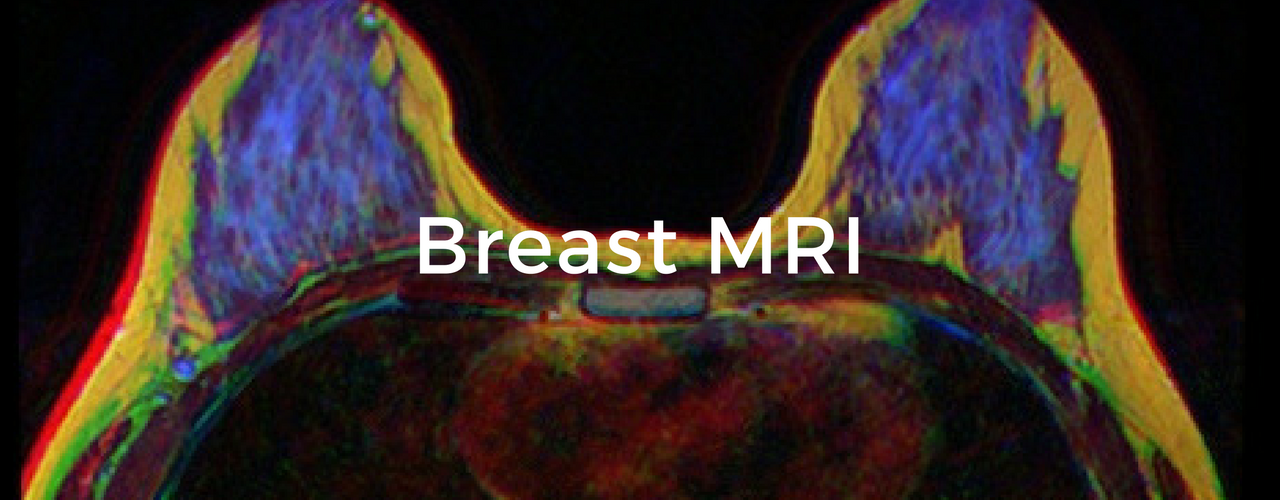Questions for your Breast Surgeon:
- Will you order a Breast MRI to look for other tumors?
- Could a Breast MRI change our treatment plans?
- Do I qualify for a “Screening Breast MRI?”
- What are the disadvantages of a Breast MRI?
What are the benefits of Breast MRIs in newly diagnosed women?
By the time someone has had a biopsy showing cancer, they likely have already had a mammogram and possibly a breast ultrasound. Once diagnosed, a “Pre-operative Breast MRI” can sometimes show other cancers that have yet to be identified by mammography or a physician’s breast examination. A Breast MRI can also provide more information about the tumor’s size and involvement of other structures such as the muscle or skin.
When used before surgery (pre-operatively), Breast MRIs identify additional cancers in the same breast in about 16% of women and can find previously unknown cancers in the opposite breast in 3 to 5%. The findings from a pre-operative Breast MRI can change the surgical plans to treat your breast cancer. Breast MRIs are commonplace today and ordered by breast surgeons. Ask your surgeon if you would benefit from a Breast MRI before your surgery.
Why a “Screening Breast MRI” for women at “High Risk?”
Women identified to be a very high risk of developing breast cancer should consider an annual screening Breast MRI in addition to their annual mammogram, according to recommendations (here) by the American Cancer Society. Together, these two screening tests give doctors a better chance of finding breast cancer in high-risk women when the cancer is smaller, easier to treat, and easiest to cure.
Consider a “Screening Breast MRI” if:
- You are a BRCA1 or BRCA2 mutation carrier
- You have a first-degree relative (parent, sibling, child) with a BRCA1 or BRCA2 mutation, even if you have yet to be tested yourself
- Your lifetime risk of breast cancer has been scored at 20 to 25% or greater, based on one of several accepted risk assessment tools that look at family history and other factors such as a biopsy showing Atypical Ductal Hyperplasia (ADH), Atypical Lobular Hyperplasia (ALH), and Lobular Carcinoma In-Situ (LCIS)
- You had radiation therapy to the chest for cancer (usually lymphoma) treatment between the ages of 10 and 30
What are the downsides of a Breast MRI?
If a breast MRI identifies a suspicious area in the breast, it may require a needle guided breast biopsy. Most of these additional biopsies prove to be benign and can result in further imaging, anxiety, discomfort, and cost. In other words, Breast MRIs can lead to breast biopsies that might be considered unnecessary.
There is also evidence to suggest that women who undergo a pre-operative Breast MRI for cancer are more likely to choose to have a mastectomy than those who do not have a Breast MRI. Some leading physicians argue that Breast MRIs lead to unnecessary mastectomies without improvements in cancer outcomes. (see below reference) Ultimately, the choice of having a mastectomy is based on your unique breast cancer situation and your personal priorities.
Should I have a pre-operative Breast MRI?
Most importantly, speak with your breast surgeon. Ask specifically what the advantages and disadvantages are for your unique situation. Over the last decade, more and more pre-operative Breast MRIs are being performed. This trend will likely continue as breast surgeons seek more information before making surgical treatment decisions.
Those that benefit most from a pre-operative breast MRI are women younger than 50 years old, those with dense breasts and BRCA mutation carriers. Ask your surgeon if your biopsy report also shows several high-risk findings such as Atypical Ductal Hyperplasia (ADH), Atypical Lobular Hyperplasia (ALH), and Lobular Carcinoma In-Situ (LCIS). If your cancerous breast biopsy also showed these High-Risk findings, then you benefit more from a pre-operative Breast MRI. You would likely also qualify for annual Breast MRI screenings in the years to come after your treatment if you are deemed at high risk and have a lumpectomy.
What is the take-home message?
In general, most breast surgeons feel pre-operative Breast MRIs are a good idea unless someone is elderly or extremely claustrophobic and would not tolerate the confined space of the MRI machine. If your breast surgeon never mentions a pre-operative Breast MRI as an option, you should inquire to become better informed.
Patient-Friendly References:
This is a detailed outline (here) on “Breast MRIs”. The Susan G. Komen organization is a leading advocacy group dedicated to assisting patients, funding research, and ensuring quality breast cancer care.
In this article (here), “Should breast MRI be used routinely in the pre-operative evaluation of breast cancer?, two leading breast surgeons debate the pros and cons in this American College of Surgeons News publication.
“Do I need an MRI?” (here) is a good overview of screening breast MRIs for women at high risk. This site is created for patients by the American Society of Breast Surgeons.
More Detailed References:
This “Position statement on the use of MRI in breast surgical oncology” (here) provides more detail in its use with newly diagnosed breast cancer. The American Society of Breast Surgeons is an organization dedicated to improving breast cancer care.
If you want to get deep into the details about breast screening, find this free PDF 70-page document (here). It lists guidelines to help clinicians appropriately screen women for breast cancer. You can easily register (here) as a non-professional to get access to more information about breast cancer.



